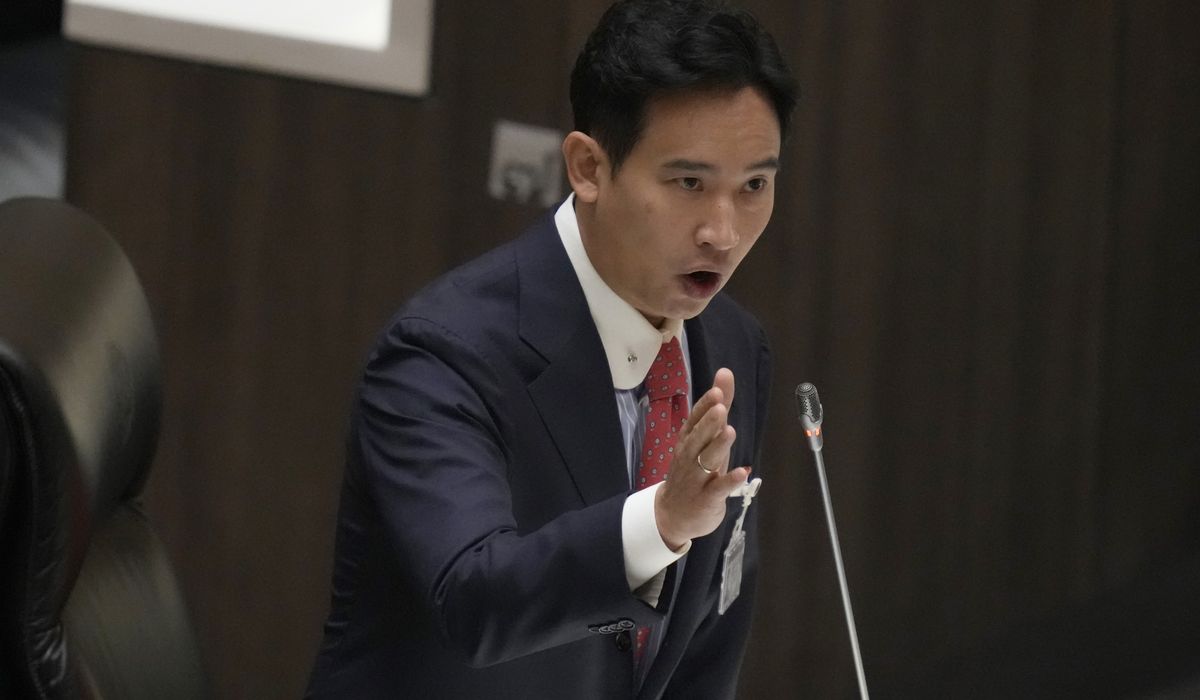


BANGKOK, Thailand — Thailand’s nine-year struggle to restore civilian democracy hit a major roadblock Thursday when the government-appointed Senate voted against the biggest winner in May’s national elections, plunging this U.S. ally into a fresh political crisis.
The Senate vote blocked the hopes of Pita Limjaroenrat, liberal leader of the new Move Forward Party (MFP), from forming a new civilian-led coalition government. Mr. Pita took the most votes in the May 14 vote, boosted by strong support from younger voters tired of nearly a decade of military-dominated rule.
Mr. Pita needed a majority of 375 votes from the combined vote of the elected House and the appointed Senate.
Official results showed Mr. Pita received a combined 334 House and Senate votes, while 182 voted against him and 199 abstained. Only 13 of the 250 senators — all appointed by the government under a new constitution pushed through by outgoing Prime Minister and former Army chief Prayuth Chan-ocha — voted for Mr. Pita.
“I just watched a rigged system work as designed, not a democratic process,” tweeted Mark S. Cogan, an associate professor of Peace and Conflict Studies at Japan’s Kansai Gaidai University.
Outside parliament, Mr. Pita’s supporters, mostly clad in their party’s orange color, listened in drizzling rain to speakers discussing the loss.
Mr. Pita, 42, wanted to reduce the U.S.-trained military’s involvement in politics and coups, and dissolve the appointed Senate which voted him down.
Opponents, including the military and supporters of Thailand’s monarchy, feared Mr. Pita will upset the country’s diplomatic, military, and economic balance between the U.S. and China, and tilt Bangkok toward Washington because he received a master’s degree in public policy from Harvard Kennedy School, and an MBA from MIT.
Thursday’s vote was the first combined sitting of parliament’s 500-member House and 250-seat Senate since May’s House election.
One of the Senate’s biggest problems with Mr. Pita is his campaign to reduce — not abolish — Thailand’s strict law against criticizing the monarchy. The law can sentence anyone to prison for up to 15 years for exposing “the king to any sort of accusation or action.”
Hundreds have been jailed under the law, while others have fled abroad.
“If you let people insult the monarchy without any laws to keep them in check, our country will burn,” warned Chada Thaiseth of the Bhumjai Thai (Proud to be Thai) party, during the debate in parliament hours before the vote.
“How about I propose a law allowing people to shoot those insulting the monarchy?” Mr. Chada said.
Mr. Pita told parliament: “The monarchy should not be used as a political tool against others. If lese majeste had not been abused, then we would not have this political conflict now.”
“I will work hard to maintain the monarchy institution,” Mr. Pita added.
But Sen. Senator Somchai Sawangkarn warned Mr. Pita’s supporters during the debate: “Don’t copy everything from the Westerners that you forget Thai-ness.,”
Thailand’s next prime minister must be endorsed by King Vajiralongkorn, crowned in 2019.
The military, royalists, and conservatives perceive the monarchy as a “pillar” of traditional Thai society and stability.
In May, Mr. Pita’s MFP won the most ballots and House seats — 14 million votes and 151 seats.
Rejecting Mr. Pita, the Senate’s vote dealt a blow to his multi-party coalition, which held a squabbling majority in the newly elected House of Representatives.
Mr. Pita may convince more senators to support him during parliament’s next vote on July 19 or 20, but another party’s candidate could be nominated.
When Mr. Pita entered parliament on Thursday for the vote, his eight-party coalition had 312 House seats. Within hours, support dwindled. His nomination attracted only 302 House votes.
If Mr. Pita is not nominated again, his coalition is expected to regroup and nominate Srettha Thavisin, a real estate tycoon leading the second-place Pheu Thai Party (PTP), which has 141 House seats in Mr. Pita’s coalition.
M.r Prayuth’s 2014 coup toppled the previous elected government and appointed the Senate in 2019, apparently as a check on the popularly elected House.
Meanwhile the Constitutional Court, which can ban Mr. Pita from politics and dissolve his MFP party, this week opened an investigation into whether he had a conflict of interest, after he inherited 42,000 shares in ITV, a media company.
Many anti-Pita lawmakers denied they were blocking a return to democracy, and pointed to those legal problems as reasons to reject him, a stance Mr. Pita’s backers called hypocritical.
